OVERVIEW: This guide psychologically decodes the Magician archetype. Related archetypes include the sage, wizard, shaman, holy man, alchemist, and wise old man.
______________
What do Gandalf from Lord of the Rings, Yoda from Star Wars, the Architect from The Matrix, and Nicola Tesla all have in common?
They are all expressions of the Magician archetype.
But what is the Magician?
And what’s the vital role this archetypal energy plays in our lives?
What is an Archetype?
An archetype is a collection of patterns or psychic energy that includes distinct thoughts, feelings, images, impulses, attitudes, and behaviors.
Think of an archetype as a subpersonality within the psyche as well as a common motif or character within storytelling.
There are many different archetypes active in our psyche, but few hold such importance and dominance as the Magician.
What is the Magician Archetype?
The Magician is the bearer of knowledge both ancient and new.
The magician archetype is synonymous with cognition.
At its highest expression, the Magician is wise, thoughtful, understanding, reflective, healing, and contemplative. It is the archetype of transformation and mystery.
As a master of technology, the Magician knows how to manipulate the elements. And as such, he possesses great power to create.
The Vital Role of the Magician Archetype
The magician archetype carries hidden knowledge (but not just of the “occult” variety).
It’s the kind of knowledge one arrives at through special training.
In King Warrior Magician Lover, Robert Moore and Douglas Gillette explain:1Moore and Gillette, King Warrior Magician Lover, 1991.
“This secret knowledge, of course, gives the magician an enormous amount of power. And because he has knowledge of the dynamics of energy flows and patterns in nature, in human individuals and societies, and among the gods—the deep unconscious forces—he is a master at containing and channeling power.”
The primary role of the magician archetype is to contain and channel power for the good of all.
When humans access the Magician in its full glory, society prospers.
When we fail to align with the true magician archetype, accessing its shadow instead, society slips into chaos.
The same is true at the individual level.
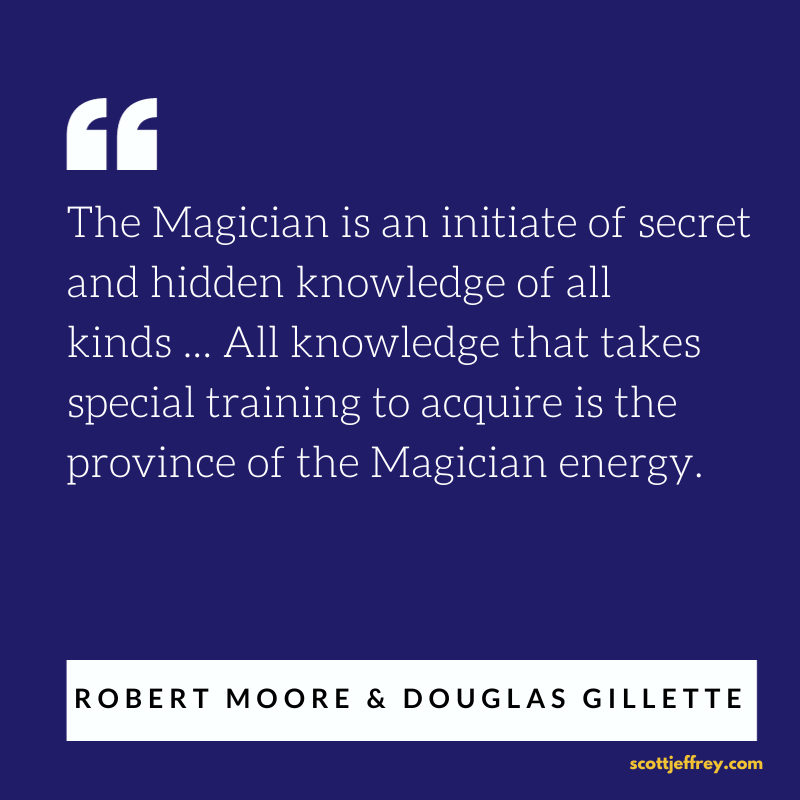
Variations of the Magician Archetype
The Magician archetype goes by many names:
Guide
Seer
Prophet
Wizard
Alchemist
Each of these archetypes is a different expression of Magician energy.
Swiss psychiatrist Carl Jung often highlighted the archetype of the Wise Old Man in his work:2C.G. Jung. “The Phenomenology of the Spirit in Fairytales,” The Archetypes and the Collective Unconscious, CW9i.
The wise old man appears in dreams in the guise of a magician, doctor, priest, teacher, professor, grandfather, or any person possessing authority.
He saw this Wise Old Man as a central figure within the psyche representing the Self at the core of one’s being.
Integrating this Wise Old Man is the final stage of Jungian individuation.
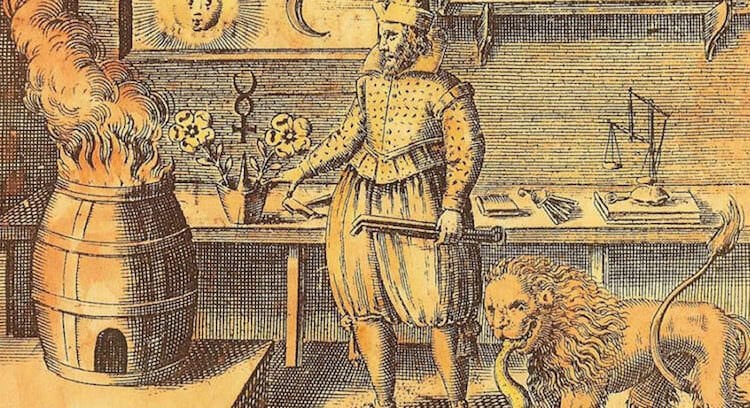
The Magician Archetype in Culture and Storytelling
In The Hero with a Thousand Faces, Joseph Campbell also highlighted the importance of this magician archetype.
Generally, early in the hero’s journey, the young hero needs help. He often receives assistance from an old man (mentor) with “supernatural aid.”
The importance of this supernatural aid cannot be overstated, as without this guidance, the hero would be unable to continue the quest.
King Arthur relied on Merlin. Neo was guided into the Matrix by Morpheus. Harry Potter got assistance from Dumbledore. Luke Skywalker needed both Obi-Wan and Yoda to become a Jedi.
Every tribe of old had a shaman or medicine man/woman to provide special aid and healing to the tribal members.
The Magician plays the vital role of the ritual elder who blesses the younger generation, allowing them to mature into manhood (which is the function of the hero’s journey).
As Moore and Gillette point out, however, the ritual elder is mostly absent in modern society.3King Warrior Magician Lover, 1991.
The lack of ritual elders is part of the cause of our current crisis in masculinity.
A Quick Note About Gender
Moore and Gillette’s work focuses on masculine psychology, but Moore’s model extends to the feminine as well.
In the case of the magician archetype, any woman accessing her cognitive line of intelligence is also tapping into Magician energy.4See Moore’s “Structures of the Self” model: https://robertmoore-phd.com/index.cfm?fuseaction=page.display&page_id=32
The Magician’s Role in Society
Inventions, discoveries, technology, language, mathematics, engineering, astronomy, chemistry, physics, law, medicine, and other sciences, all fall within the Magician’s domain.
All knowledge that requires specialized training derives from Magician energy.
The Magician archetype is an initiate of hidden knowledge of all varieties. And as such, he is an initiator for others.
The Magician takes students, apprentices, or disciples. All students studying in any field are apprentice shamans or Magicians-in-training.
As an apprentice, you undergo an ordeal by investing large amounts of time, energy, and money studying and testing your capabilities to become a master of the Magician’s powers.
And, as in any hero’s quest, there’s no guarantee that you’ll succeed.
When people have questions, problems, and pains, they seek the Magician for resolution.
Why Kings Kept the Counsel of Wizards
King Arthur wasn’t the only king with a Merlin. Kings always had a wizard, magician, mage, oracle, or seer by their side.
Why?
The Magician was the king’s strategist, helping him think things through to a just end. But more than that, the Magician was able to reawaken the conscience and good sense of the ruler. In fact, moral refinement is a defining quality of the magician archetype.
The Magician played the role of a kind of royal psychotherapist, keeping the ruler’s arrogance in check. The Roman emperors who failed to take the counsel of the Magician became tyrannical dictators. And the tyrant’s hubris (outrageous arrogance) eventually led to the fall of Rome.
(Does this sound familiar to what we’re seeing manifest in world politics today?)
An individual fully accessing the Magician’s energy has discernment. He can see evil for what it is and perceives “the wolf in sheep’s clothing.”
In this way, as Moore and Gillette point out, the magician archetype in a man is his “bullshit detector.”
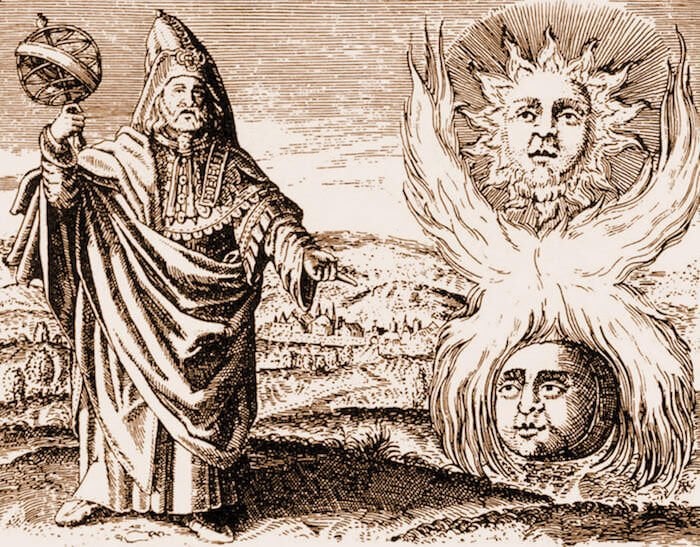
The Magician’s Bi-Polar Shadow
With the power to create worlds also comes its opposite: the ability to manipulate and destroy them.
In modern society, it is more often than not, the Magician’s shadows that operate in individuals with power over others.
And so, the most significant lessons we can learn about the magician archetype come from taking a closer look at its shadow.
Until we do, both individually and collectively, this shadow will continue to rule us from the darkness of our unconscious.
In neo-Jungian Robert Moore’s model, like all the archetypes, the Magician has a bipolar shadow with an active and passive side:
- The active shadow side is the Detached Manipulator
- The passive shadow side is the “Denying” Innocent One.
Let’s take a brief look at each one.
The Detached Manipulator
The Detached Manipulator is the Trickster archetype.
Because the Magician is the bearer of knowledge, when left unchecked, it can use this knowledge to control others.
The primary way the Trickster manipulates others isn’t necessarily by lying (although it does that too), but by withholding.
That is, the Detached Manipulator will give half-truths, withholding vital information others may need for their progress or well-being.
The Architect in the second Matrix film, The Matrix Reloaded, is the quintessential Detached Manipulator.
Disconnected from nature, feelings, and emotions, the Detached Manipulator is cold, calculating, cynical, and soulless.
The Detached Manipulator and Money
The Manipulator archetype mostly runs modern society. Instead of using its knowledge to serve others, the cynical manipulator mainly profits from it.
A primary tool for the Detached Manipulator is money. Whenever money is involved in an exchange, there’s a good chance the Manipulator is at work.
Money influences the Manipulator to provide limited information and charge lots of money.
We can observe this Manipulator operating in many spiritual teachers who amass fortunes while keeping their followers subservient to them. (See Wild Wild Country, a documentary about spiritual guru OSHO who accumulated 93 Rolls Royces.)
The Detached Manipulator runs most governments. The entire advertising industry is the Manipulator’s game.
In fact, fashion, pharmaceutical, counseling, medicine, defense, education, self-help, and countless other industries are run by this shadow archetype.
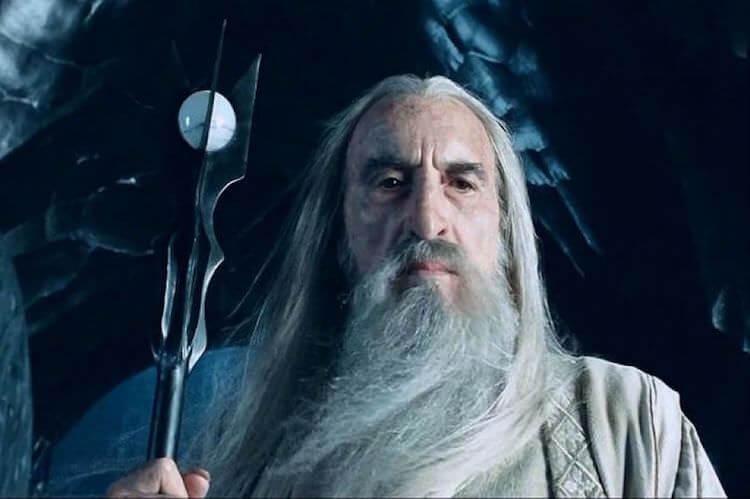
The Detached Manipulator in Our Daily Lives
This Trickster archetype is one of the most common forces in society, and yet its stealthy nature allows it to operate within society and ourselves largely unchecked and unnoticed.
Moore and Gillette explain:5King Warrior Magician Lover, 1991.
“Whenever we are detached, unrelated, and withholding what we know could help others, whenever we use our knowledge as a weapon to belittle and control others or to bolster our status or wealth at others’ expense, we are identified with the Shadow Magician as Manipulator. We are doing black magic, damaging ourselves as well as those who could benefit from our wisdom.”
Anyone in a teaching role or position of authority (including parents) must remain mindful of the Detached Manipulator.
When the Trickster in us manipulates others, he also damages us. When there’s no one around to toy with, this detached archetype focuses his energy on manipulating us.
As such, the Detached Manipulator expresses itself inwardly as self-deception.
The Denying Innocent One
The passive side of the Magician’s shadow is the Denying Innocent One.
While the Detached Manipulator plays the perpetrator, the Innocent One plays the helpless victim.
The Denying Innocent One keeps us from opening our eyes and seeing Reality more clearly.
The Denying Innocent One believes it is a good person and so we bury our heads in the sand to avoid owning the destructive manipulation game our dark brother is playing.
Parents unconsciously activate this shadow in their children by praising them. Praise doesn’t just stall growth and limit our potential; it instills a false identity and illusory self-image in children that plague them into adulthood.
It’s this so-called innocence and false goodness of spiritual teachers and religious authorities that lead to the manipulation of millions of individuals every day.
While greed and lust for power mainly motivate the Manipulator, envy fuels the Denying Innocent One. The Innocent One envies the lives of others and their drive to share freely.
Simultaneously, the Denying Innocent One fears others will discover his lifelessness and lack of responsibility.
The Magician’s Shadow Parts Go Hand-in-Hand
Thinking types in Myers-Briggs and Types 5, 6, and 7 in the Enneagram are arguably the most prone to the Magician’s shadow.
But modern society is dominated by what the Jungians call the thinking function. We all tend to have a bias toward the mind and cognition. After all, this is the technological or information age, right?
Because of the bipolar nature of this shadow archetype, the Detached Manipulator and the Denying Innocent One always go hand-in-hand.
Another way of explaining this bipolar nature is through inflation and deflation.
- An inflated ego that feels superior to others is accessing the Detached Manipulator.
- The Innocent One is a deflated ego who secretly feels inferior to others.
Confusion is often a sign that the Innocent One is hijacking us.
How to Bring the Magician’s Shadow to Awareness
If you feel confused, consider what you may be hiding from (envy, fear, not living your values, a lack of responsibility, etc.)
The key to catching the Manipulator-Innocent One game is radical self-honesty.
These shadows maintain their dominance until we call them out, which requires self-reflection and a willingness to look beyond our current self-identity.
Remember: It’s not a question of whether or not we get possessed by these shadow archetypes, but to what frequency and degree.
Only through self-reflection and emotional awareness can we bring these shadows to light.
The Trickster archetype is a prevalent force in our psyche because of our dishonesty and disconnection from our feelings.
Detachment from emotions and the physical body tends to trigger the inner manipulation game.
How to Activate the Magician Within
Because of our bias toward thinking and the mind, the fast track to accessing the magician archetype is through the body and the heart.
Drawing excess energy from the mind to the heart and gut regions, allows us to access the Magician’s energy constructively without succumbing to its shadow (as often).
By holding to our Center, we naturally access the Magician’s energy.
When we fall out of the Center, the shadows take over.
This occurs every time we move too fast and we cut ourselves off from the energy flow within us.
When we live exclusively in our minds, the Manipulator and the Innocent One are likely in charge.
So to access the Magician archetype more often:
- Reforge your connection to nature by grounding yourself
- Steady your mind by settling your breath.
- Realign your body’s energy system by standing like a tree.
- Reclaim the power that you may have handed over to others by reclaiming your inner gold.
- Establish your inner world by dialoguing with the archetypes in your psyche.
- Accept responsibility for your outer world.
- Be honest with yourself and confront your shadow.
Bring the Magician into its full glory by integrating body, mind, heart, and soul.
More on the Magician Archetype
This guide was inspired by:
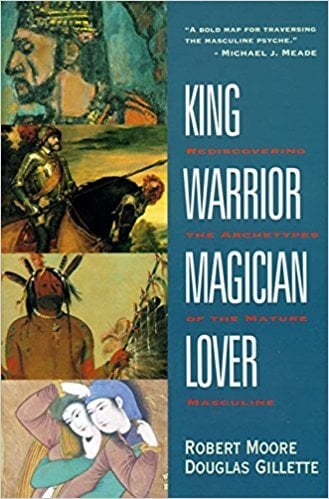
Read Next
A Beginner’s Guide to Classic Jungian Archetypes
The Hero Archetype: A Definitive Guide
The Definitive Guide to Energy Vampires
Carl Jung’s Theory of Anima and Animus
What Do You Think About the Magician Archetype?
Please share your thoughts, questions, and feedback below.

This gave me pause, to think of my past and the times I have been duped….mainly duping myself…Great Article
Indeed, Frank. The Trickster has duped us all … many times. We’ve become so conditioned to lie to ourselves since childhood that we don’t even know we’re doing it anymore. Thanks for the comment.
Ahhhhhhh…Self-honesty. Been working on this one and grateful for the insight this post has provided. I’m done hiding from myself.
I’m glad you found this guide insightful, Dan. Thanks for your comments.
Isn’t it amazing how skillful we are at hiding from ourselves?
Wow, this resonated so much. I’m working on my business that is defined as The Magician within the branding and on tests have identified with the Trickster shadow. Very interesting to see how the two correlate and great advice for my marketing and to keep my brand and myself in check! Thank you!
Hey Alex,
That’s great to hear that this guide resonated with you. Yes, the Trickster is the Magician’s “darker brother.”
Thanks for sharing your experience.
Joseph Campbell would be humbled to know how you articulated his insight So I will express this for him Thank you! Be well Be happy
Rocky 8 2 2018
Thank you for the kind words, Rocky. :-)
As a FEMALE channeling the Magician I have witnessed and integrated the depths of “him” within my unconscious, wow. I feel your perspective on how it plays out through exploitation and capitalism through the Collective is bang on. I couldn’t even believe what blinders I had had in this Archetype in the past. I honestly believed I was doing “good”, I also love how you didn’t mention Jung’s anima/animus. I feel we don’t need to talk about them anymore. lol they’re so dated. The only time I feel it relevant is that s a woman it’s important to understand that my Shadow Anima will play off that. In the past when I was caught in the unconscious Trickster I was such a perfect unconscious embodiment of the “anima queen” to my inner magician. Breaking the stranglehold of how this archetype plagued me in my pursuit of illusionary power was probably one of my greatest achievements. Now I can “catch it” and redirect the energies and knowledge for the Collective benefit.
Thanks for your comments, Raven.
I do address the anima/animus, but it’s a separate guide.
https://scottjeffrey.com/anima-animus-jung/